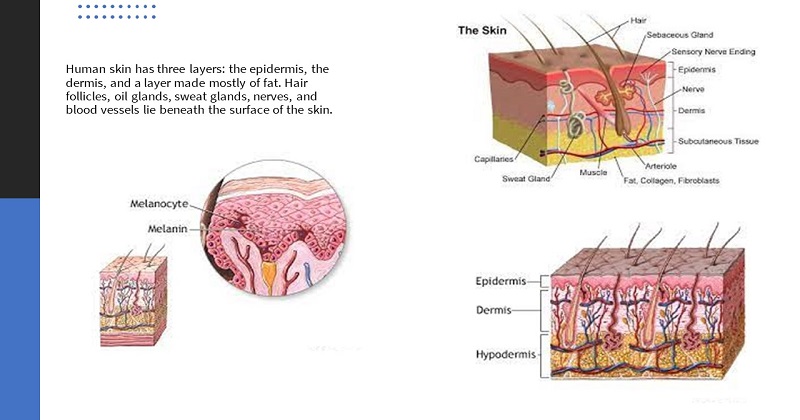Body organs aren't all internal like the brain or the heart. There's one we wear on the outside. Skin is our largest organ—adults carry some 8 pounds (3.6 kilograms) and 22 square feet (2 square meters) of it. This fleshy covering does a lot more than make us look presentable. In fact, without it, we'd literally evaporate.
It makes up about 15% of your total body weight. Skin acts as a waterproof, insulating shield, guarding the body against extremes of temperature, damaging sunlight, and harmful chemicals. It also exudes antibacterial substances that prevent infection and manufactures vitamin D for converting calcium into healthy bones. Skin additionally is a huge sensor packed with nerves for keeping the brain in touch with the outside world. At the same time, skin allows us free movement, proving itself an amazingly versatile organ.
Human skin has three layers. The epidermis is the thin outer layer. Dead cells of the epidermis constantly flake off as new one’s form. Cells in the epidermis produce a substance called melanin. Melanin creates different skin colors. The epidermis has cells that make nails, too.
The middle skin layer is called the dermis. It is thicker than the epidermis, which it supports and strengthens. The dermis has fibers that make the skin tough and stretchable. Pits in the dermis, called follicles, make hair. The dermis also contains blood vessels and nerves. Nerves are fibers that send information picked up by the senses to the brain.

The third, deepest layer of the skin is made up mostly of fat. This fat supplies nutrients to the other two layers. It also cushions the body and protects it from the cold.
The body releases some substances through the skin. Sweat glands send a watery liquid called sweat through pores, or tiny openings, on the skin’s surface. Sweat cools the body. Other glands in the skin produce an oil that can give the skin a slightly greasy surface. This oil helps keep the skin flexible. However, too much oil can cause a skin condition called acne.
Keep It Clean!
Unlike other organs (like your lungs, heart, and brain), your skin likes a good washing. When you wash your skin, use water and a mild soap. And don't forget to cover scrapes and cuts with gauze or a bandage. This keeps the dirt out and helps prevent infections. It's just one way to be kind to the skin you're in!